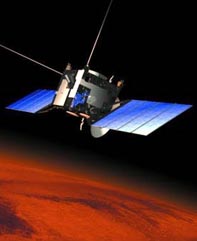Methane (CH4) is a colorless, odorless gas that is the main ingredient of natural gas used for fuel. Methane on Earth is produced by animals, bacteria and decaying organic matter which give off so much that methane is the primary greenhouse gas in our planet's atmosphere.

March 31, 2004 Darmstadt, Germany - The amount of methane in the Martian atmosphere is estimated to be 10.5 parts per billion, which amounts to 33,000 tons of methane. Methane would be expected to survive as a gas in the Martian atmosphere for about 300 to 350 years before broken down into water and carbon dioxide by the UV radiation from the sun. On Earth, methane is a by-product of biological activity and so this discovery implies the methane source might also be biological on Mars. If there is currently 33,000 tons of methane in the Martian atmosphere, that means 100 tons per year were produced over the 300 to 350 years. That is 300 kilograms per day and implies there is one or more sources able to produce these amounts of methane for a long period of time.The methane data is being analyzed by Physicist Vittorio Formisano, Ph.D., Principal Investigator of the Planetary Fourier Spectrometer (PFS) which is mounted on ESA's Mars Express Orbiter to detect methane. Dr. Formisano is based at the Institute of Physics and Interplanetary Science in Rome, Italy. But given the exciting discovery of methane in the Martian atmosphere, Dr. Formisano is now in Darmstadt, Germany, gathering more data from the Planetary Fourier Spectrometer in hopes that he will be able to find one or more sources of the methane by the end of April. I talked with him today in Darmstadt about possible methane sources, including biological life and volcanoes.
Click here to subscribe and get instant access to read this report.
Click here to check your existing subscription status.
Existing members, login below:
© 1998 - 2024 by Linda Moulton Howe.
All Rights Reserved.

